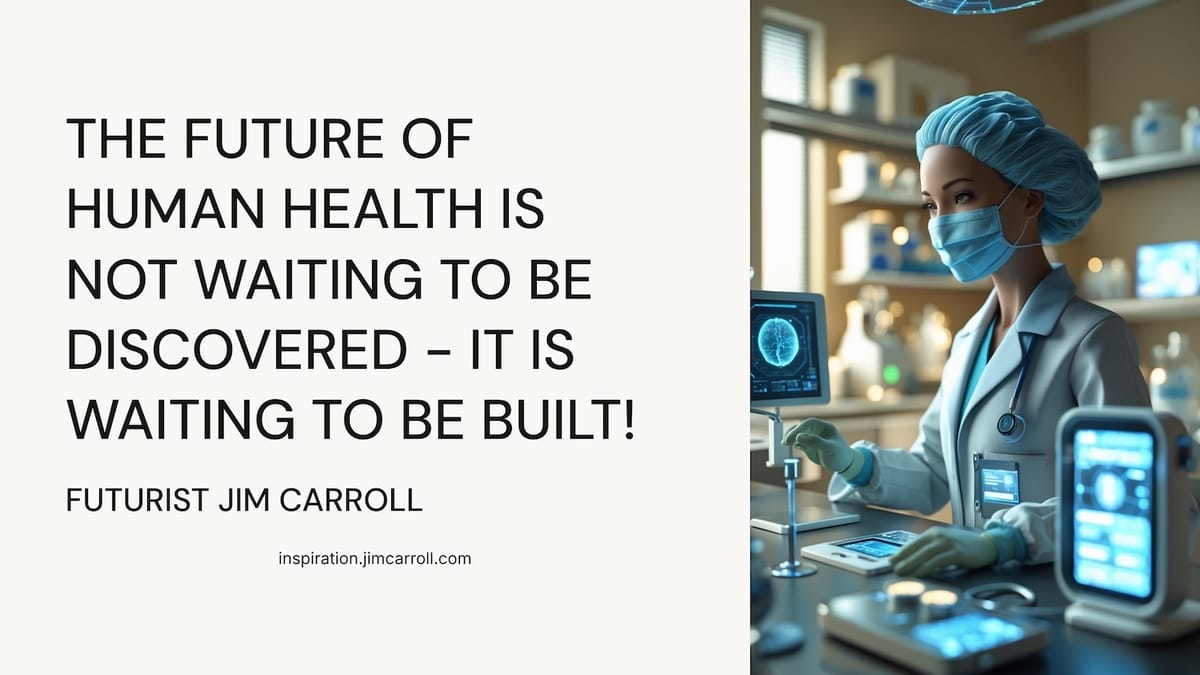"The future of human health is not waiting to be discovered - it is waiting to be built!" - Futurist Jim Carroll
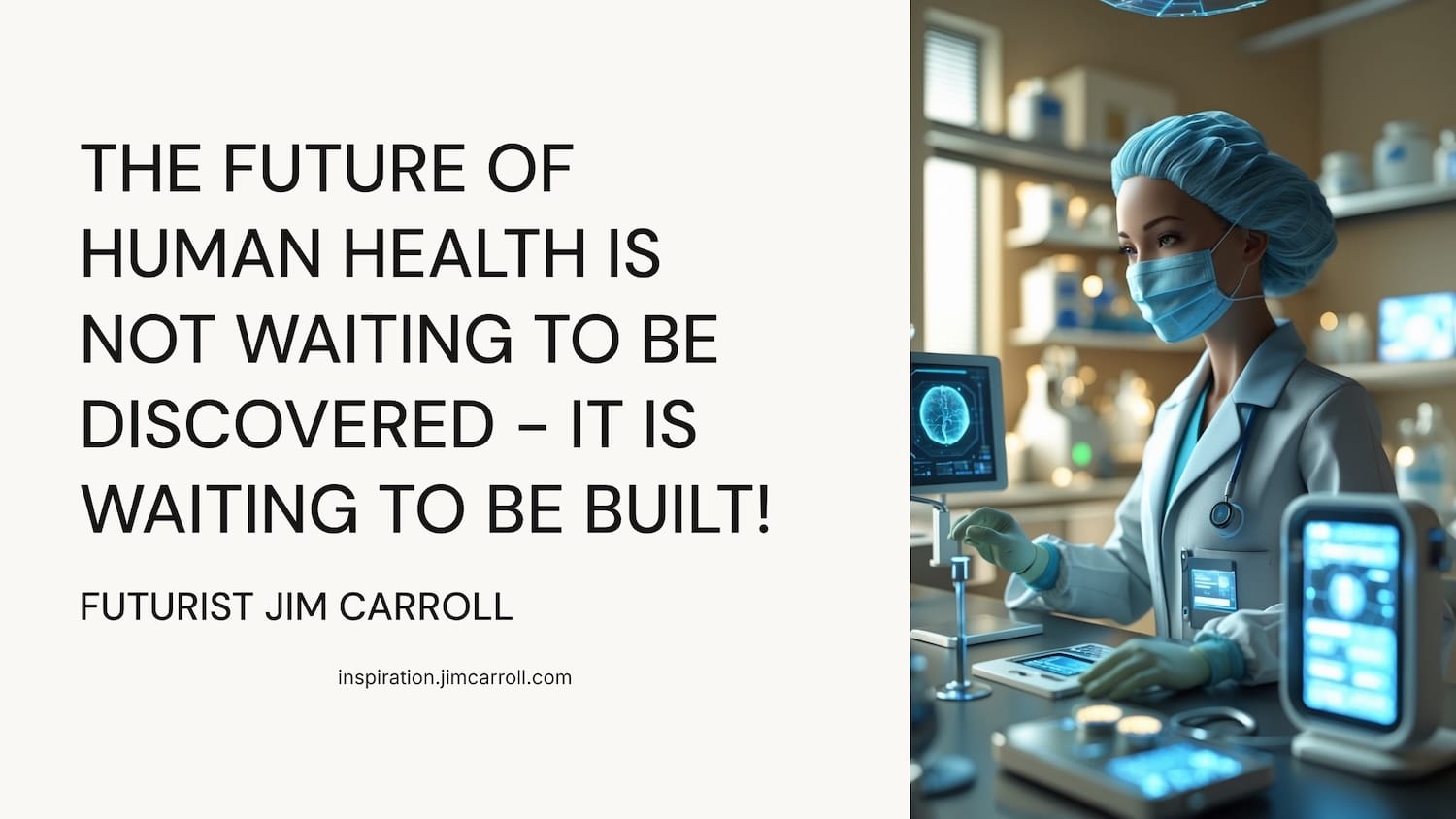
Some weeks ago, in my Megatrends series, I wrote about the future of healthcare - in particular, the impact or preventative medicine, predictive medicine, and accelerating longevity.
Those posts drew the interest of a good friend of mine in Australia - a medical doctor and healthcare researcher. She wrote to me:
Your latest ones have caught my attention, really fascinating! Plus, I’m at a bit of a crossroads in my public health career. In particular, Megatrend #10 - Predictive and Preventative Healthcare got me thinking. Prevention has always been our goal, but seeing where technology is headed makes me wonder how the role of public health might change in the years ahead.
You mentioned how this megatrend depends on societies having a mature relationship with science and the future, and I couldn’t agree more. That’s always been the challenge for public health as it doesn’t offer quick/obvious wins, it relies on decision–makers understanding that the investment pays off in the long run through various improved outcomes, and I’m not sure governments are ready to invest more heavily in it anytime soon.
I’m starting to think more seriously about how I might contribute in other ways, maybe my next move should be into the private sector.
Would love to hear your thoughts on how you see this evolving and where someone like me might best fit into this next phase of healthcare.
Well, that got me thinking - and the whole issue entered my 'thinking queue,' and I've been pondering over the question for the last few weeks.
Here's what I want to tell her.
What's fascinating is how these three megatrends are converging in ways that make your expertise essential, with initiatives that are occurring in the private sector:
- Predictive and Preventative Healthcare (#10) requires someone who understands population health patterns and can design systems that identify risk before symptoms appear.
- Longevity Science (#11) focuses on healthspan, not just lifespan – companies need professionals who understand how health behaviors compound across populations.
- Personalized Medicine (#12) moves from universal pills to individualized treatments, but requires scaling personalized approaches without widening health disparities.
As I wrote in Megatrend #10, the medicine of tomorrow isn't about the miracle cure; it's about the predictive insight that makes the cure unnecessary. These companies desperately need people who understand health from a systems perspective, not just a technology perspective.
Your skills become essential to these companies is in three areas:
- Product and Strategy: Clinical Product Manager roles where you'd ensure technology meets genuine health needs
- Health Equity Lead positions ensure products work across diverse populations, including regional and Indigenous communities.
- Data and Research: Population Health Data Scientist roles help shape research questions that matter, helping design studies that identify population-level patterns predicting disease onset rather than just tracking metrics.
- Trust and Validation: Clinical Validation Manager positions designing real-world studies to prove impact for TGA submissions, marketing claims, and partnerships with insurers.
The thing is, given your recognition of the long-term investment required, it's more likely that the private sector will provide the big, bold solutions the new world of medicine involves. When health tech companies demonstrate clear ROI on prevention, they create the business case governments have struggled to articulate. In that context, your public health background provides the clinical credibility that separates genuine healthcare tools from simple gadgets - and that might be a game changer with new technologies such as wearables.
And here's the key point to consider - the future of health is being written right now. The question isn't whether public health professionals belong in tech companies – it's which companies will be smart enough to recognize they need you.It also involves having the courage and belief in your skills to make a big, bold leap at this moment in your career, jumping in when you are most uncomfortable with a career change, and yet doing so at the exact right time that the private sector needs someone like you.
Need a bit of encouragement?
I've been having some fun with AI lately, exploring what these new career paths might look like by 2030, and specifically, thinking about the new careers that could exist in 5 or 10 years. Imagine yourself in one of these roles. These are the very jobs you might find yourself working in. If you want the full document I prepared, the PDF is right here.
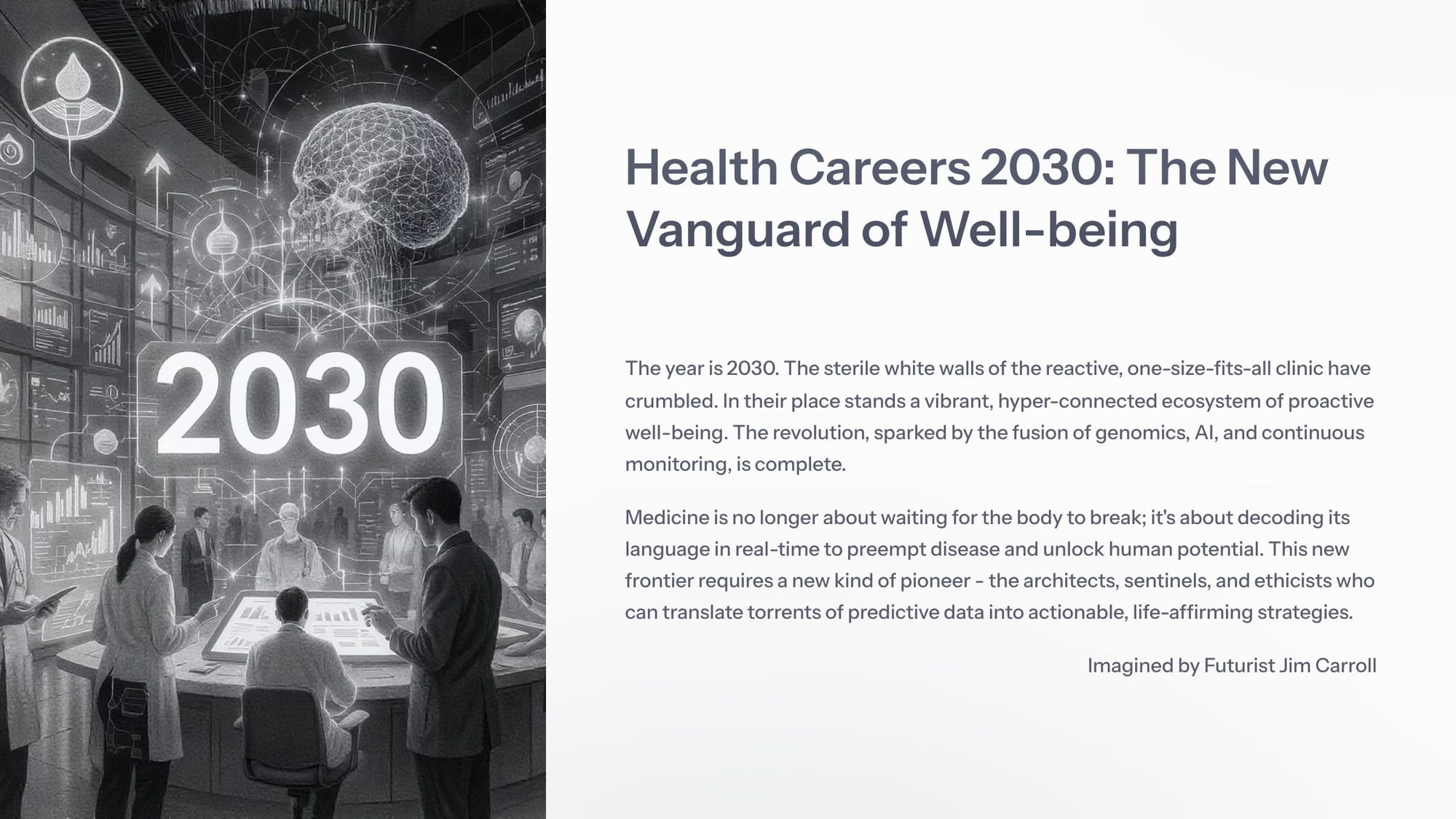
Bio-Harmony Architect: Designing personalized lifestyle blueprints using genetic data and continuous biomonitoring. Your role? Ensuring these hyper-personalized plans reach underserved populations, not just the "worried well."
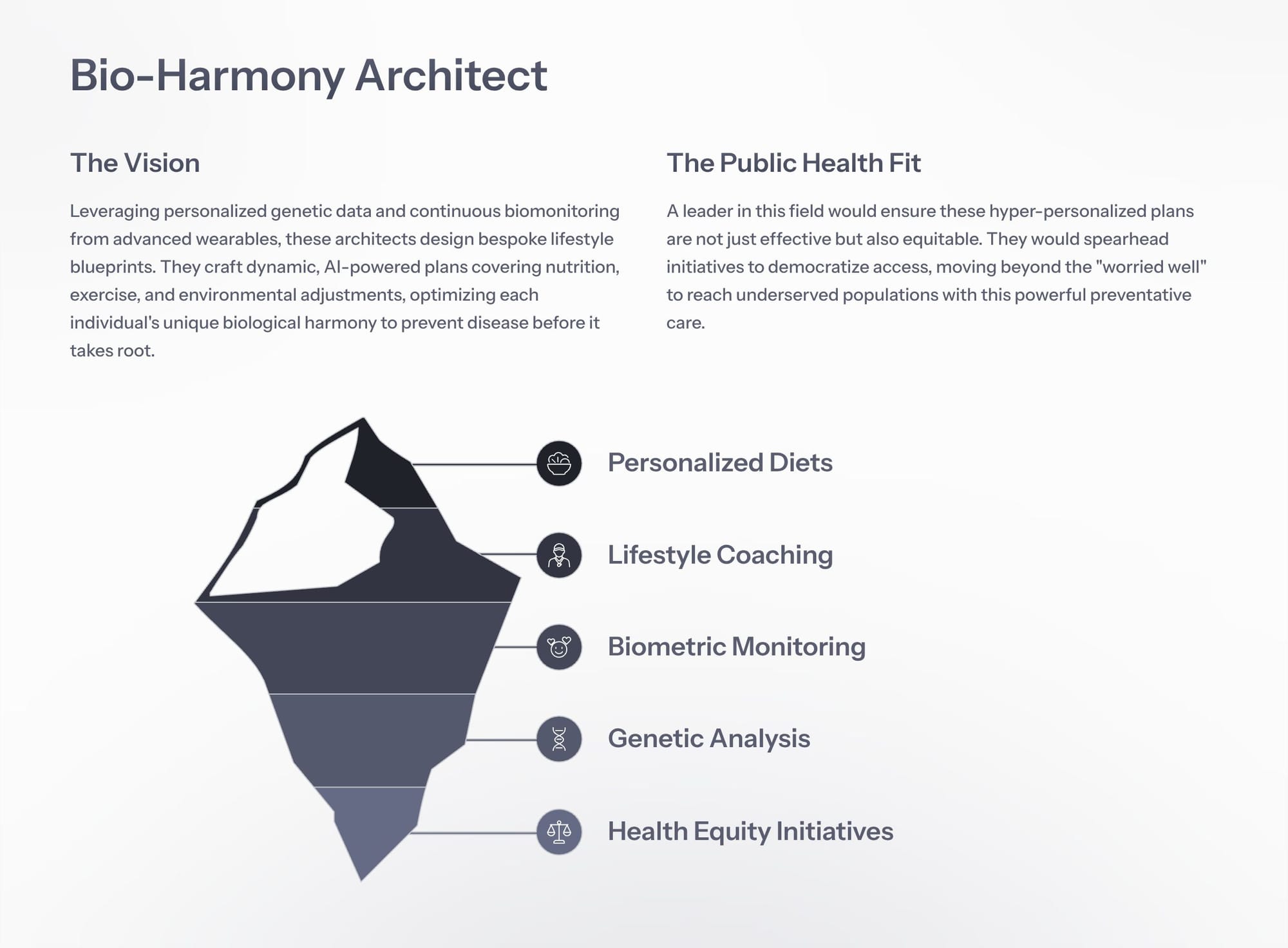
Predictive Health Sentinel: Operating health intelligence networks that flag impending flu outbreaks or cardiac risks months in advance. This is epidemiology supercharged – refining algorithms and orchestrating preventative responses from regional command centers.
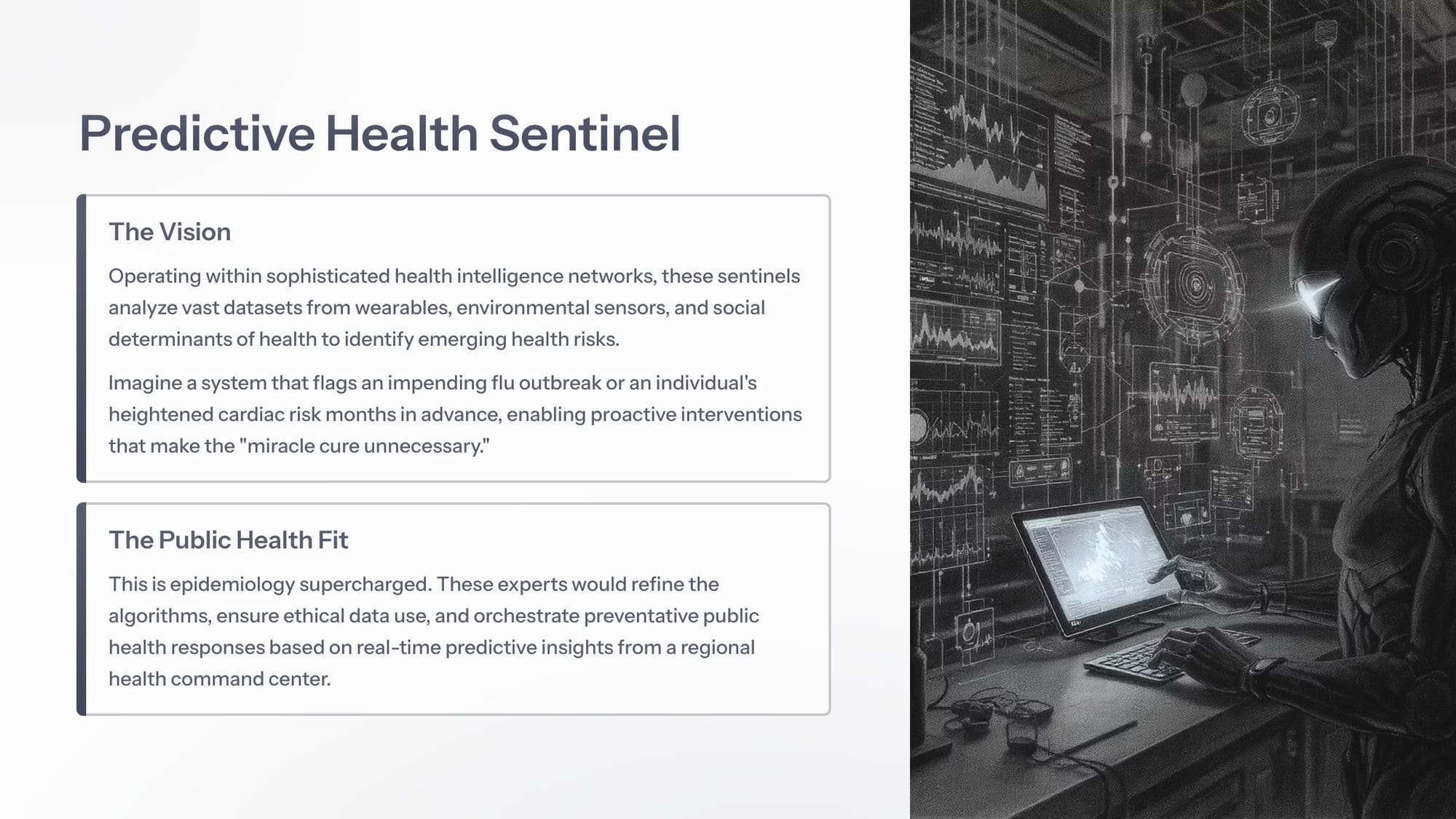
Health Behavior Futurist: Creating gamified interventions that make preventative health the easy, default choice. Your deep understanding of behavior change theories positions you perfectly to design city-wide initiatives that reward healthy choices.
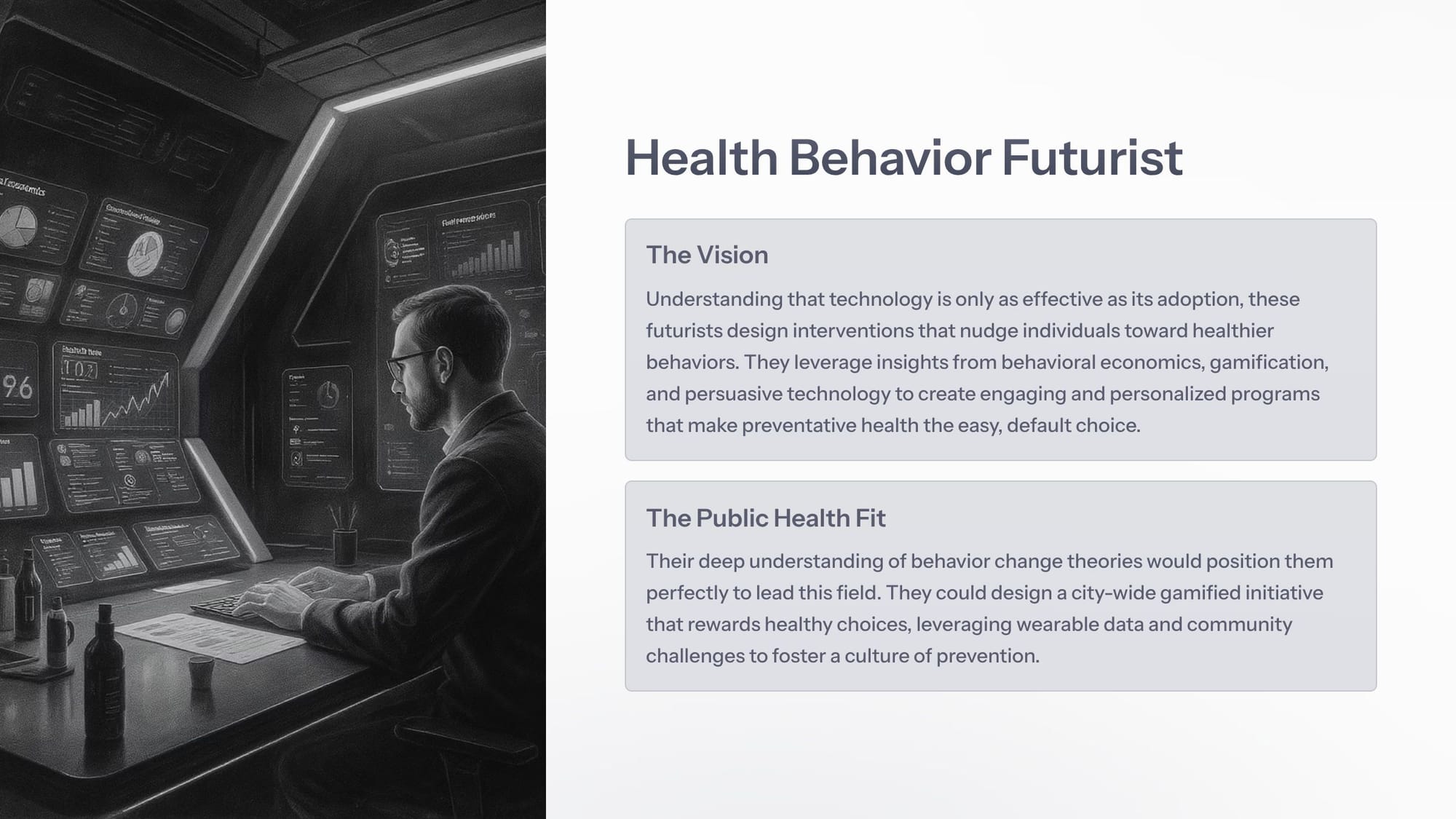
Environmental Health Forecaster: Acting as a "health meteorologist," fusing real-time environmental data with population health data to predict localized health threats before they emerge. You'd deploy preventative resources and turn entire cities into healthier environments.
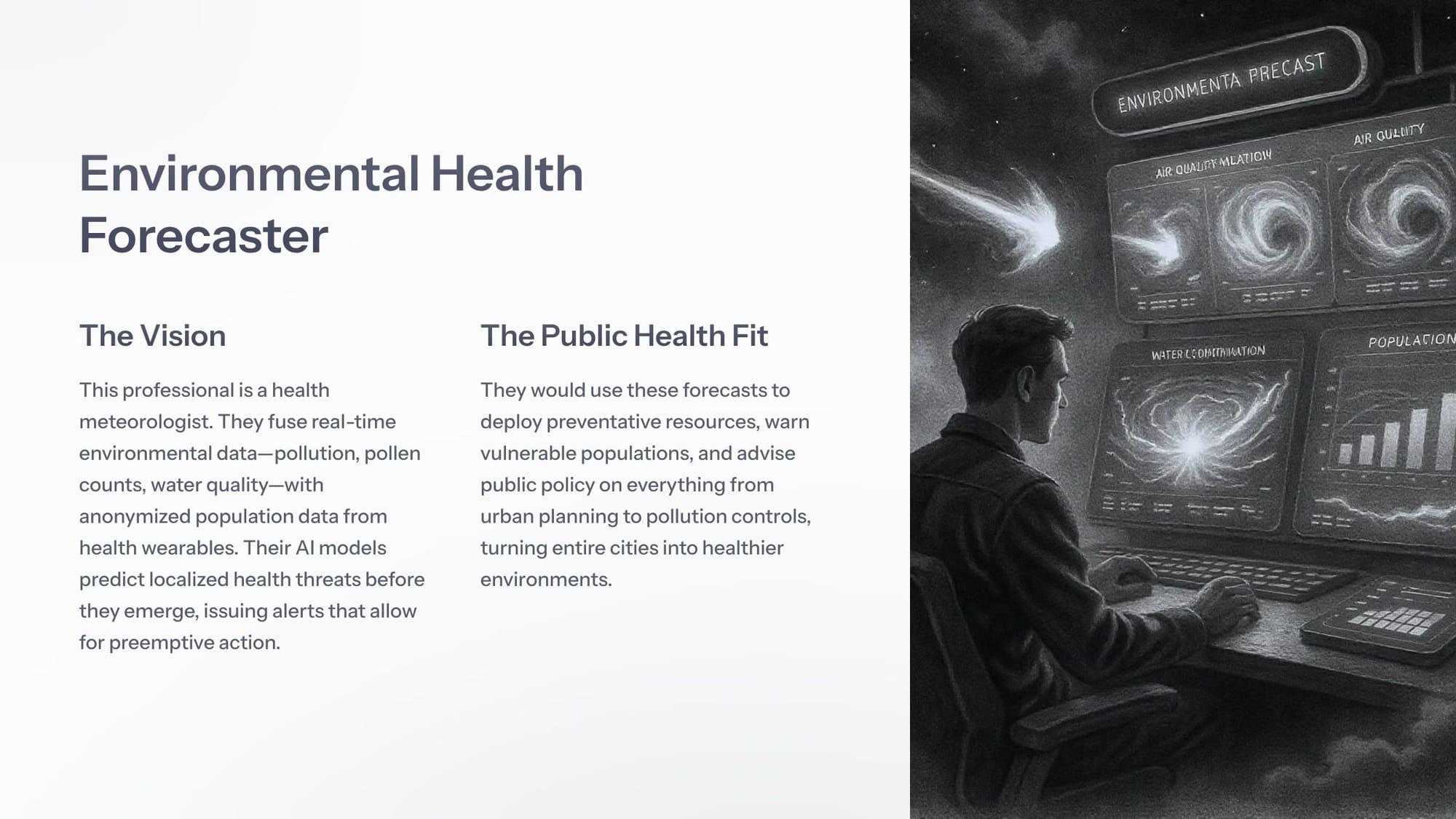
Health Equity Ethicist: The crucial watchdog ensuring cutting-edge therapies don't create a biological underclass. This role combines your understanding of health disparities with ethical principles to advocate for systems that lift entire populations.
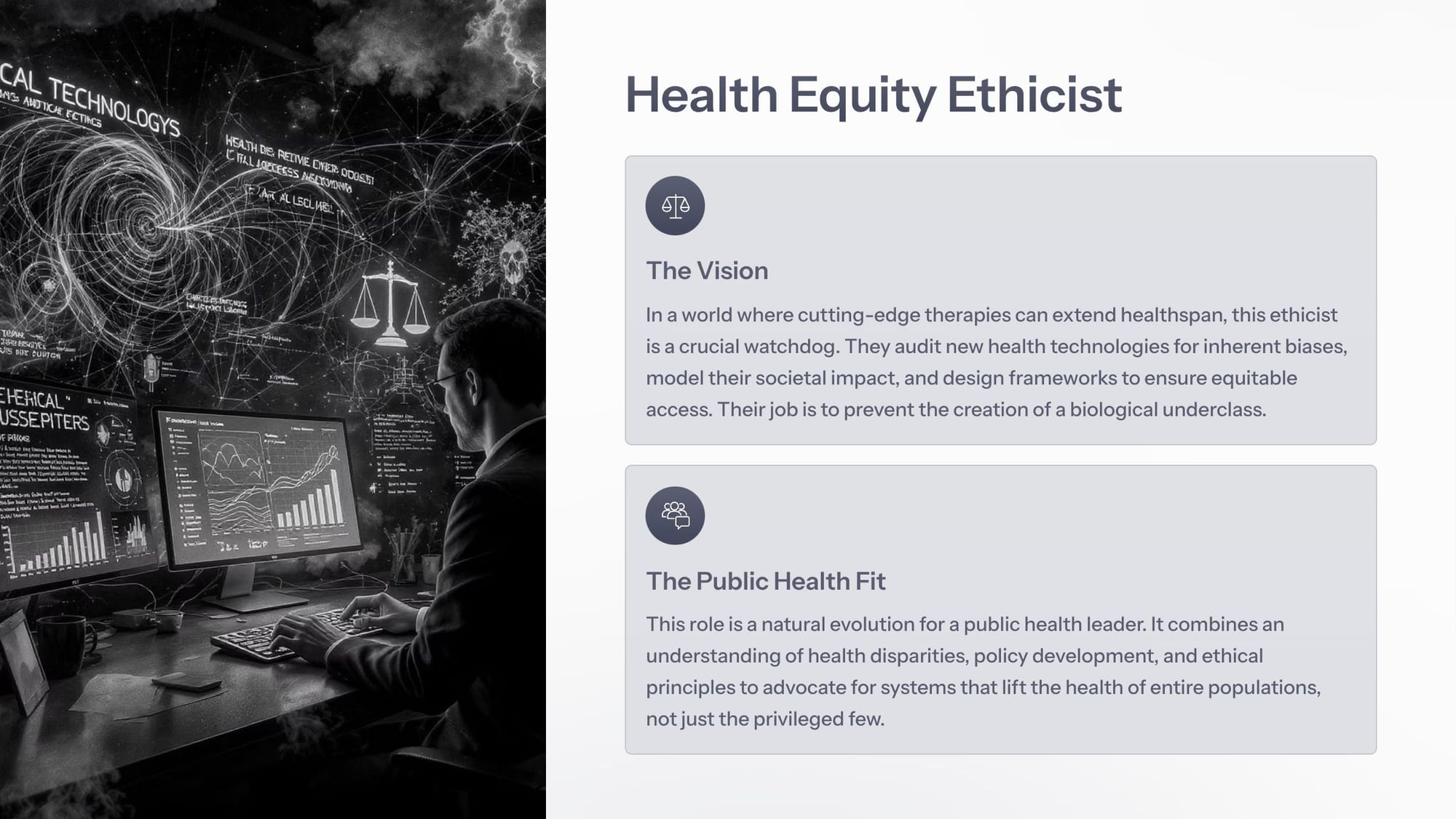
Longevity Navigator: Inspired by "Longevity Science," these navigators guide individuals through the complex landscape of interventions aimed at extending healthspan. They curate personalized strategies incorporating the latest in nutrigenomics, senolytics (therapies targeting aging cells), and advanced fitness regimes. Their role is to translate groundbreaking research into actionable, sustainable paths toward a longer, healthier life.
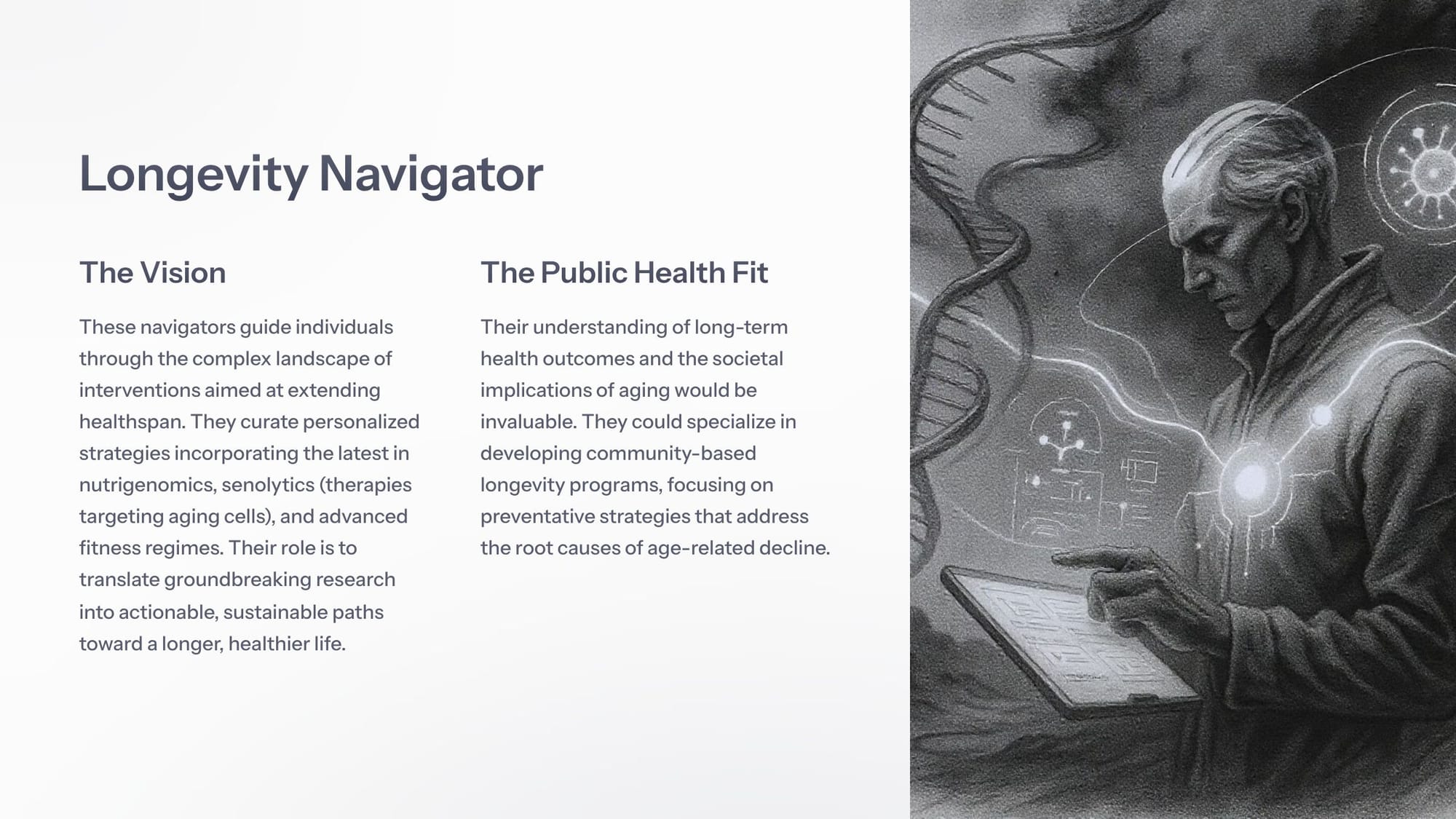
Digital Health Integration Specialist: As the "Super-App" and interconnected health ecosystems become a reality, these specialists will be the architects of seamless data flow and user experience. They ensure that the wealth of information generated by wearables, home diagnostics, and AI assistants is effectively integrated into individual health records and accessible to both individuals and their care teams in a meaningful way.
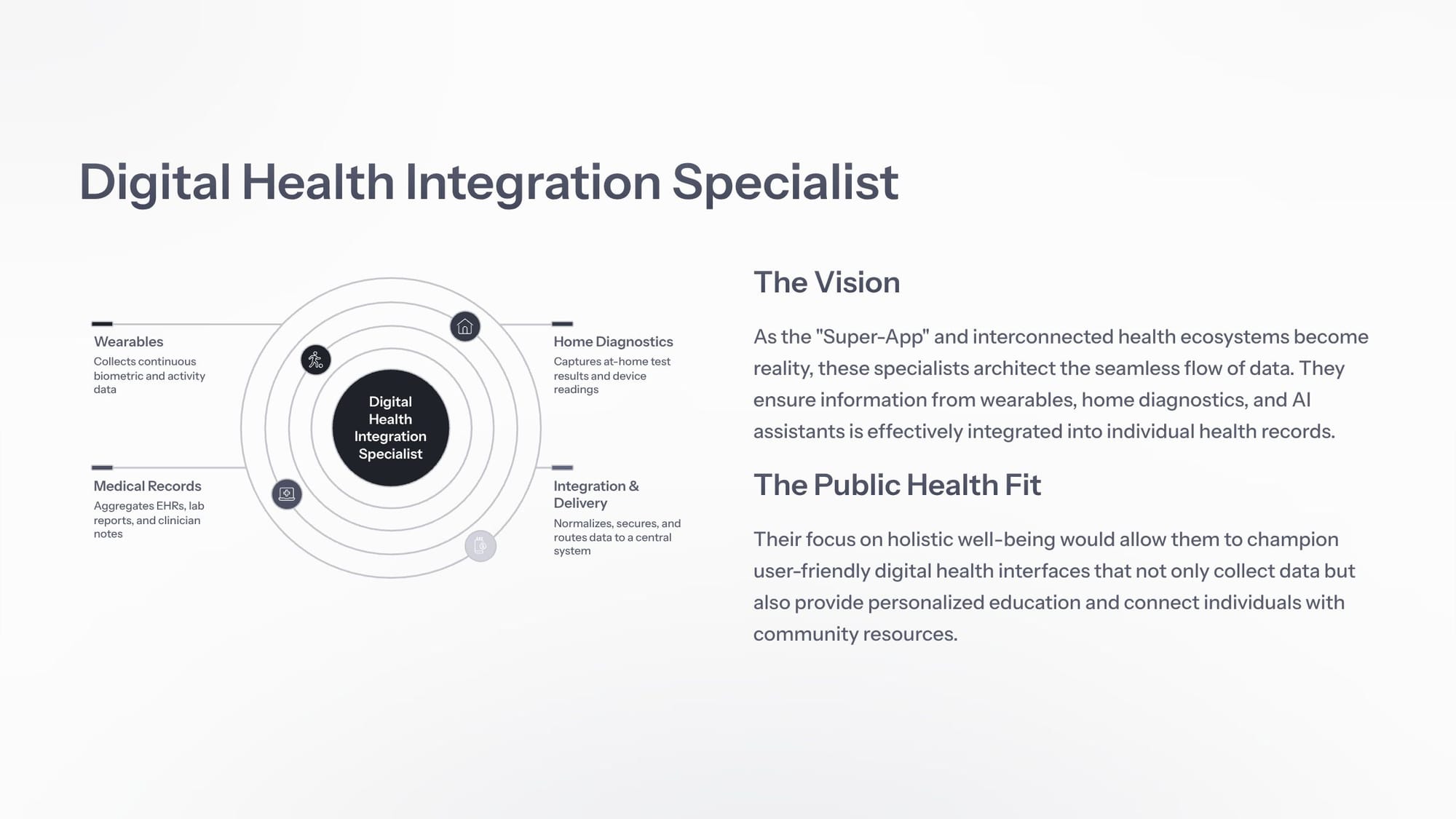
Genomic Nutrition Designer: Moving far beyond conventional dietetics, this professional acts as a culinary pharmacist. Using an individual’s genomic profile, microbiome data, and real-time metabolic feedback from smart implants, they design foods and supplements that actively regulate gene expression. They don't just recommend what to eat; they formulate precise nutritional interventions to switch off disease pathways and optimize cognitive and physical performance.
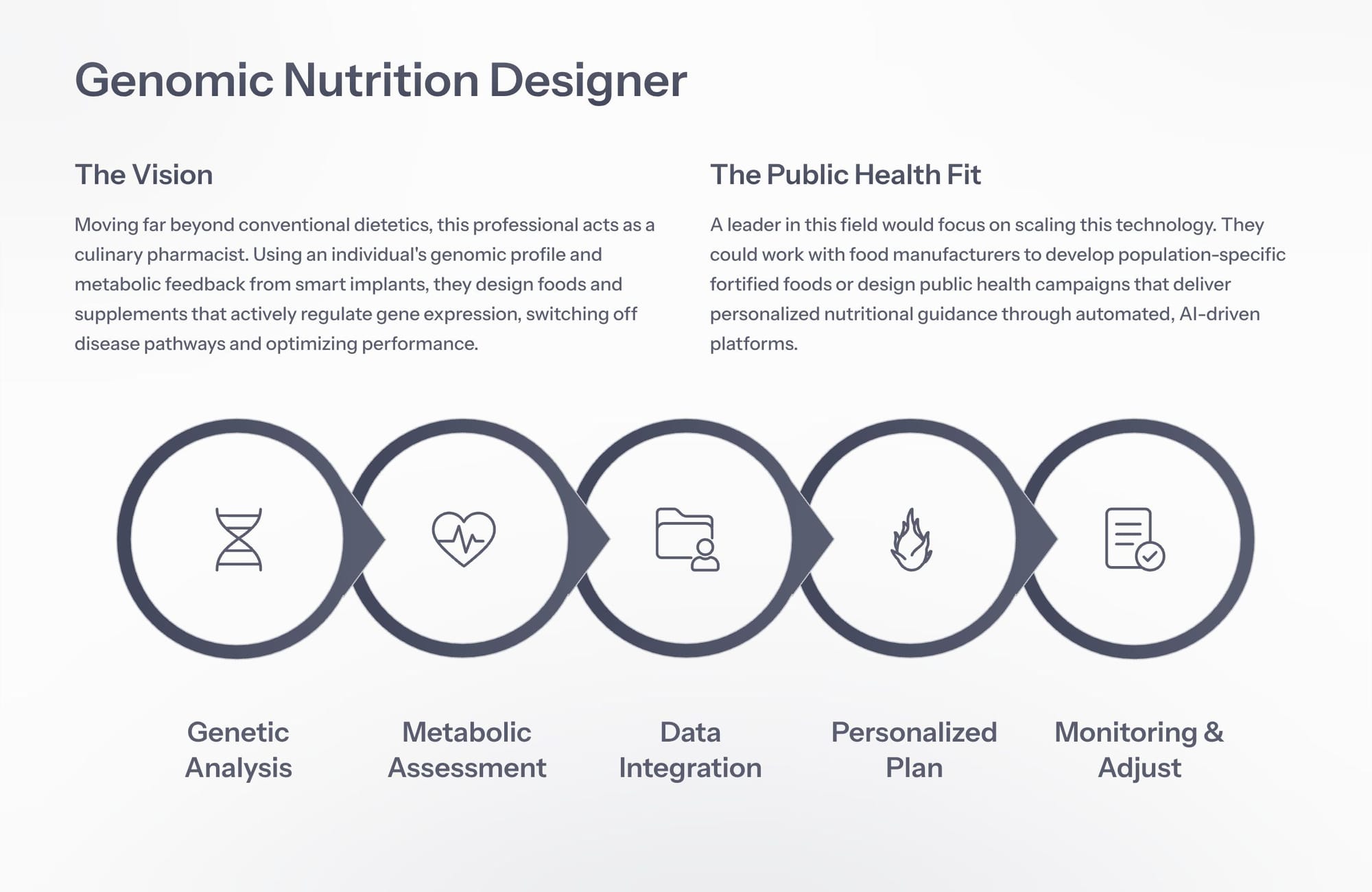
Cognitive Wellness Engineer: This specialist focuses on the final frontier: the brain. Using a suite of neuro-wearables that monitor brainwave patterns, neurochemicals, and sleep architecture, they create personalized regimens to enhance cognitive function and preempt neurodegenerative diseases. Their interventions are a blend of targeted neuro-stimulation, mindfulness protocols, and precision nutrition designed to maintain brain plasticity and resilience for life.
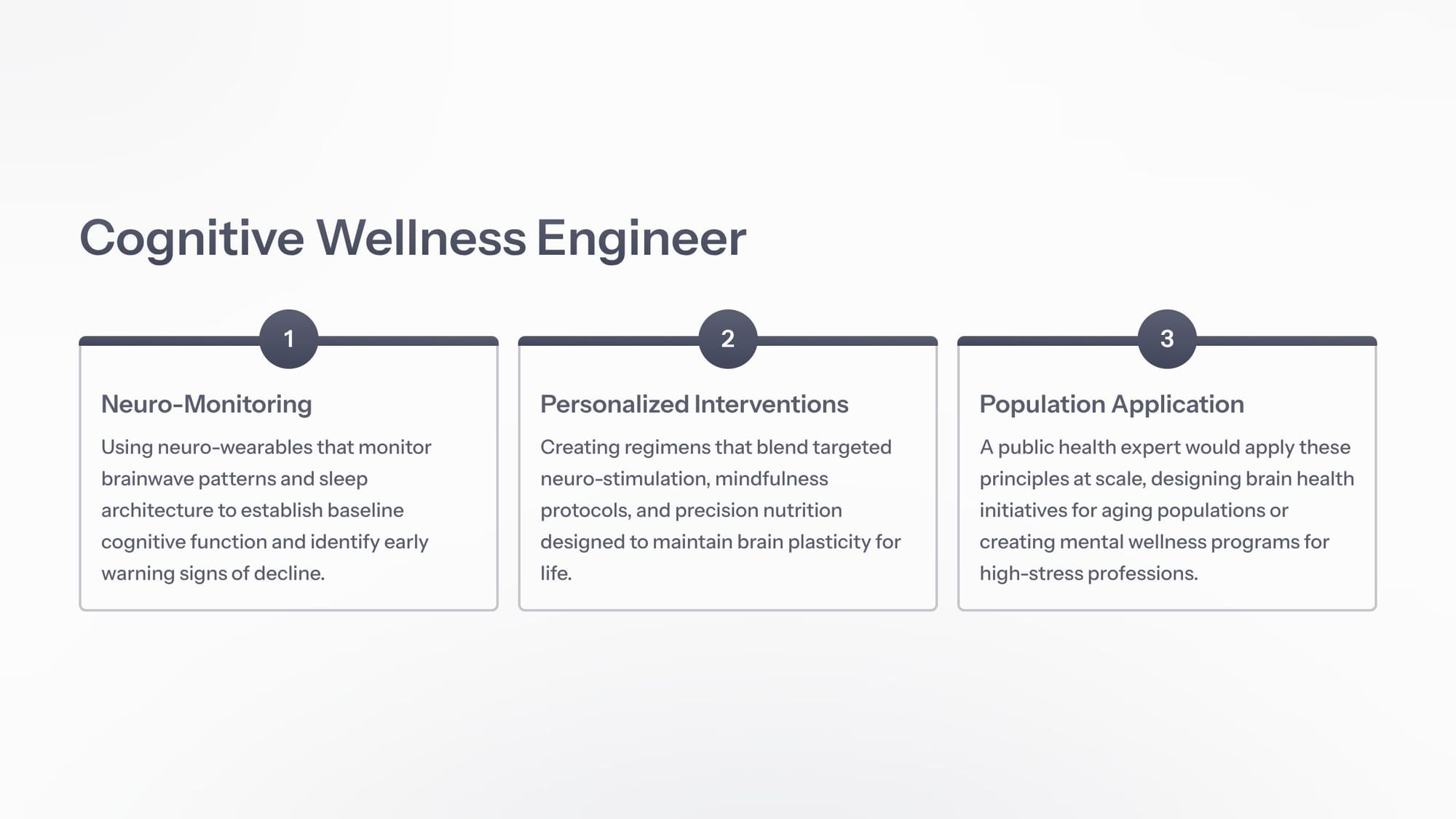
These aren't mere jobs – they're missions. Here's how they break down:
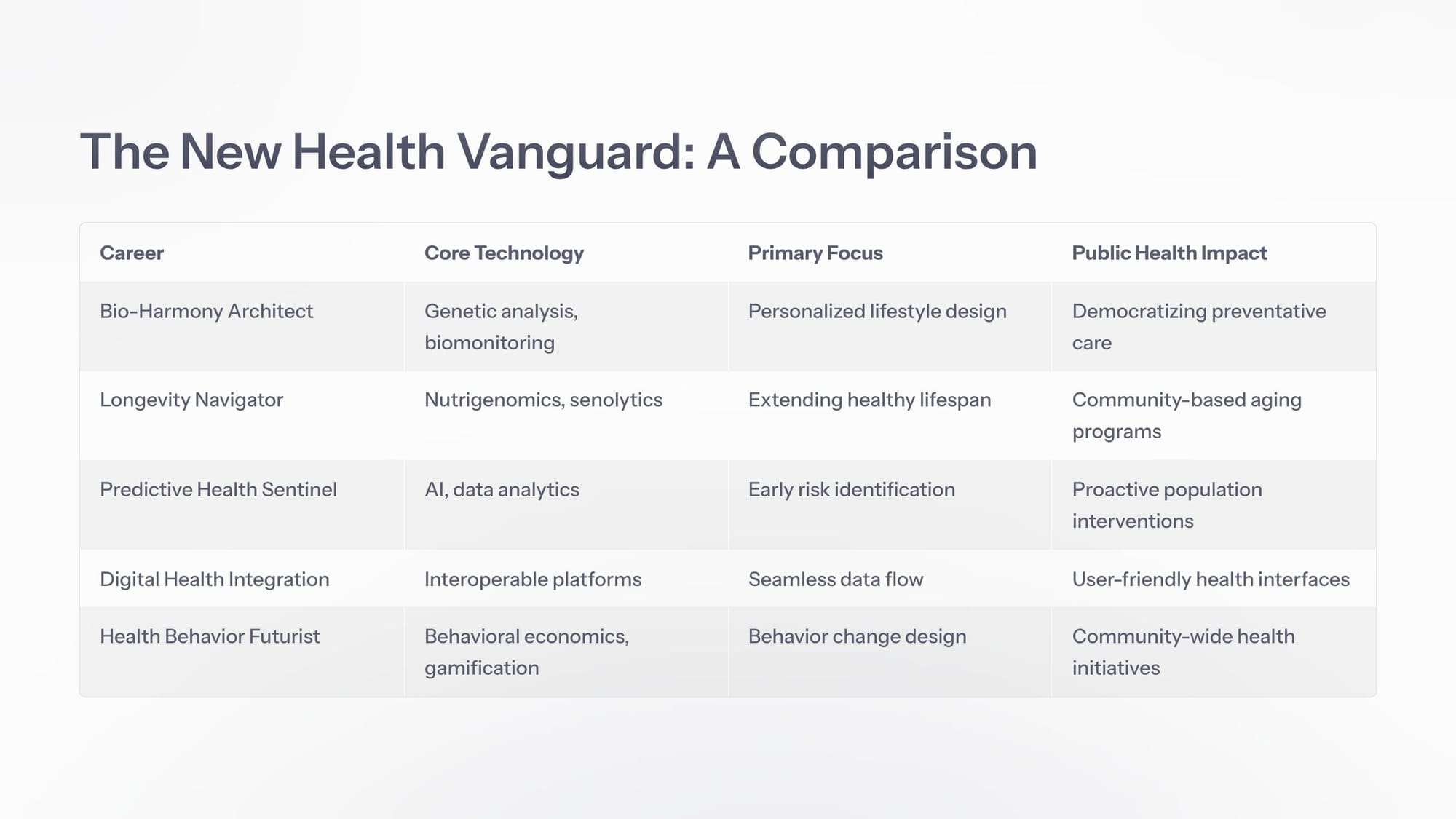
The data is flowing, the technology is here, and the future of human health isn't waiting to be discovered – it's waiting to be built.
The only question is: who will be the architects?
You?
Over the last 30 years, Futurist Jim Carroll has consistently predicted the emergence of many new careers.

